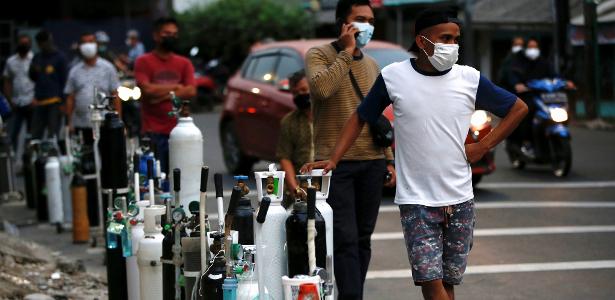
Indonesia is facing a shortage of oxygen supply that has forced some hospitals to turn away patients infected with the COVID-19 virus during a period which saw the largest increase in the number of cases since the beginning of the epidemic.
Despite emergency measures in place since Saturday, the archipelago set a new record of injuries and deaths on Monday, adding pressure on hospitals, which had already been on the verge of collapse for more than a week in the face of an influx of infected people.
Today, the authorities reported 29,735 new cases and 558 deaths, bringing the total to 2.31 million infections and 61,140 deaths from COVID-19.
Deaths due to lack of oxygen
A hospital in Bandung, Java, with a population of 2.4 million, announced last night that due to lack of oxygen, it will not be able to receive more patients with respiratory problems in the coming days.
RS Al-Islam Bandung Hospital posted on its Instagram account, saying it would re-evaluate the decision on Wednesday “Due to lack of oxygen, we are temporarily unable to accept patients with shortness of breath.”
The shortage of oxygen tanks began last week and is spreading across the country, although it is primarily a problem on the island of Java, where more than 50% of the country’s population of 270 million lives.
Over the weekend, 63 patients with COVID-19 died at Sargeto Hospital in Yogyakarta, in the central region of Java, when their oxygen tanks ran out.
In a statement issued on Sunday, the hospital director, Rukmono Sisweshanto, said he had already informed the authorities, including the health minister, on several occasions of the impending problem.
In response, the Indonesian government has ordered that the production of oxygen for medical use be prioritized to meet the estimated demand of 800 tons of oxygen per day.
family shortage
In recent weeks, many users have posted pictures of patients on social media, some carrying small oxygen cylinders to hospital doors while waiting for a bed to become available.
The Red Cross had already warned last Tuesday of the danger of hospital collapses in Indonesia, with official data showing that 47% of hospital beds were occupied, a figure as high as 93% in the case of Jakarta.
The international organization added that the outbreak is linked to the delta type, which experts see as the most contagious.
partial confinement
And the authorities imposed since Saturday partial confinement and tightening of the measures that will last until July 20, which focus in particular on the islands of Java and Bali.
The order doesn’t force people to stay home all the time, but it does impose temporary closures on schools, religious sites, parks, museums, sports stadiums, malls, bars and restaurants, among other places.
In addition, it decides that workers not assigned to essential services will continue to work from home, while sectors such as finance, food, construction, energy and communications, among others, can go to offices under strict health protocols.
Persons wishing to travel long distances must provide a certificate of vaccination with at least one dose and a negative test result.
Some health experts in the country have warned that these measures may not be sufficient to contain the virus due to the rapid and widespread spread of the virus throughout the archipelago.
So far, Indonesia has vaccinated more than 5% of its population with its full treatment regimen, mostly with the CoronaVac vaccine.
Health workers on the front lines in the fight against the epidemic and other fully vaccinated people have contracted the virus and some have died despite being vaccinated weeks ago with immunity.

“Proud explorer. Freelance social media expert. Problem solver. Gamer.”






